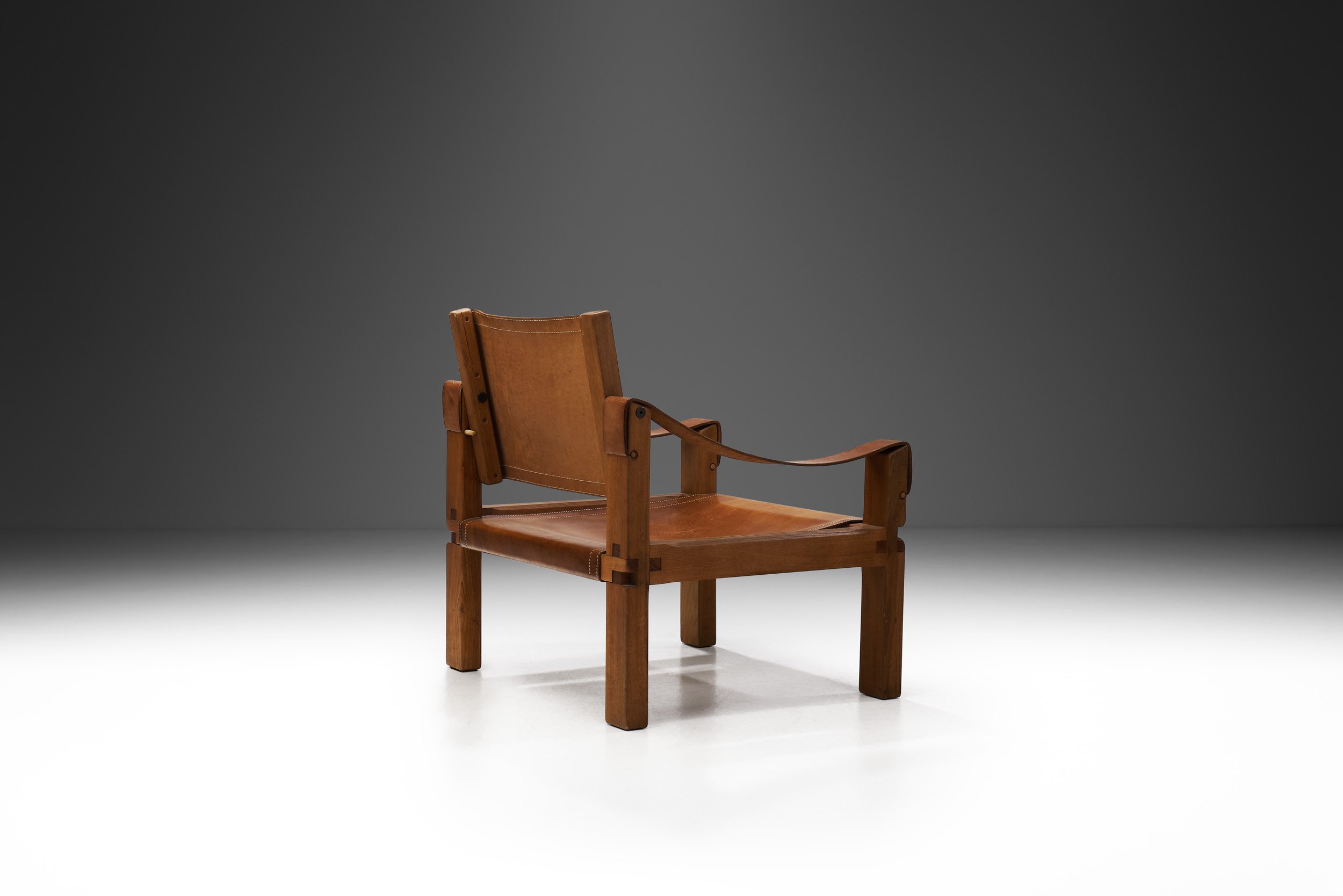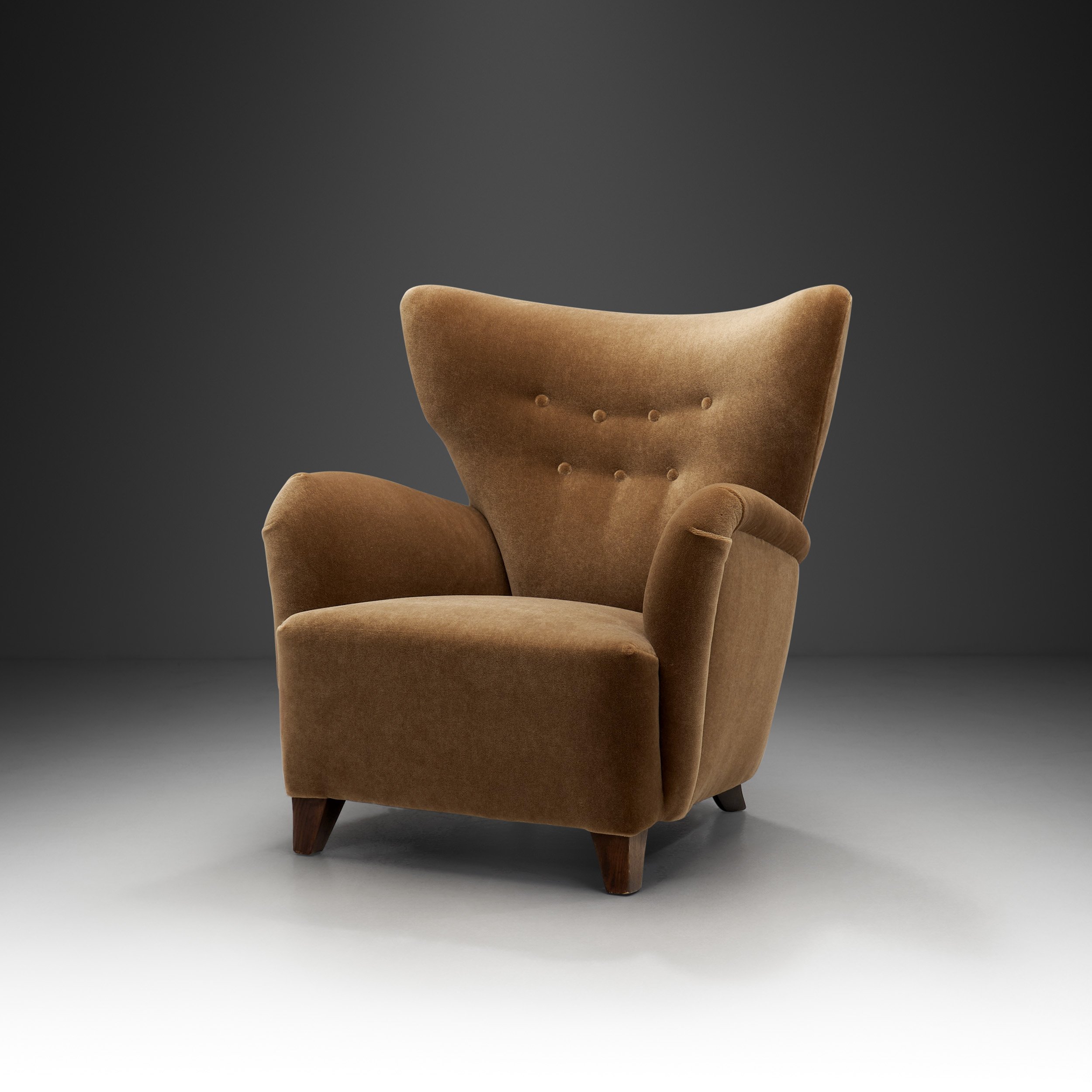Pierre Chapo "S10" Lounge Chair for Atelier Chapo, France 1960s (sold)
















Pierre Chapo "S10" Lounge Chair for Atelier Chapo, France 1960s (sold)
The “S10” model, also known as the “Sahara” chair, was designed in 1964, and is without a doubt one of the most elemental works of the French designer, architect, and craftsman, Pierre Chapo. This chair from his X series delivers a generous, honest and authentic design with impeccable construction and pure lines.
Chapo was a true craftsman, who specialized in handmade wooden furniture using traditional methods. The chair features the "48x72" assembly technique which is present in many of Chapo's designs and whilst this shows complexity, it nicely contrasts with the simplistic overall design and the frames that can even be dismantled. Produced in solid elm and the highest quality saddle leather, the structure is held together by the tension of the leather seat on the frame. At first glance, the detailing of this chair may appear restrained, but upon a closer look, the refined and exquisite methods become obvious. This is especially visible in Chapo’s trademark mortise and tenon joints that feature a complex series of cuts that allow the design to exclude screws and follow the “48x72” technique. Thanks to this, the chair’s joinery technique is not only seamless, but the outstanding craftsmanship becomes part of the design itself visually as well. The elegant patinated cognac leather straps paired with the beautiful elm wood command attention which is partly why this chair model is a seminal work of Chapo and French mid-century modern design.
The “S10” chair was manufactured in his own atelier in France during the 1960s. Between craftsmanship and industrial design, Pierre Chapo’s furniture is golden and solid, which is why they are still highly collectible. Pierre Chapo said of his furniture that it was made “with sincerity and beautiful materials, materials that human beings have always touched, always worked.”
SOLD
Condition:
In good vintage condition. Wear consistent with age and use. The cognac leather upholstery has some marks and a beautiful patina. Each of our items can be re-upholstered by our in-house atelier in a fabric of choice. Please reach out for more information.
Dimensions:
27.16 in W x 26.57 in D x 29.13 in H; Seat height 13.18 in; Arm height 19.48 in
69 cm W x 67.5 cm D x 74 cm H; Seat height 33.5 cm; Arm height 49.5 cm
About the designer:
Pierre Chapo was born in Paris on July 1927. He was initially interested in becoming a professional painter, however, after a chance meeting with a shipbuilder who introduced him to wood and wood crafts, Chapo changed his focus and decided to study architectural studies at the prestigious École Nationale Supérieure des Beaux-Arts in Paris.
After graduating, Chapo and his wife, the sculptor, and painter Nicole Lormier, started travelling extensively through Scandinavia and Central America. Among the many places the couple visited was the home and studio of Frank Lloyd Wright in Taliesin West. A visit that had a lasting influence on Chapo’s future work and designs.
After returning home, Chapo began to create his own designs at the end of the 1950s and started marketing them with the assistance of his wife. It didn’t take long before his designs attracted a devoted clientele. Chapo wanted more than sheer 'utility' and believed that furniture design should be something that was aesthetically pleasing. He championed designs that were individual, timeless and had a universal quality. He was a big advocate of the importance of the golden ratio.
In 1960 Chapo was awarded the gold medal of the city of Paris at an exhibition of arts and crafts. Most of his work at that time was produced at a workshop in Clamart. However, by the late 1960s Chapo wanted a new challenge, and he began to depart from his successful designs. Influenced by the work of Charlotte Perriand, whom he admired a lot, he began to rethink his whole approach to furniture. Along his design work Chapo promoted his views in a series of lectures, in France and abroad, on woodworking and wood craft and urged students to preserve the traditional crafts.
During his 30-year career Chapo never lost his commitment to the traditional crafts of cabinet-making and joinery and believed that they were essential for great furniture. His work can be seen as a fusion of modern design and traditional craftsmanship. In all his work the love of wood and its qualities is evident. ~H.












